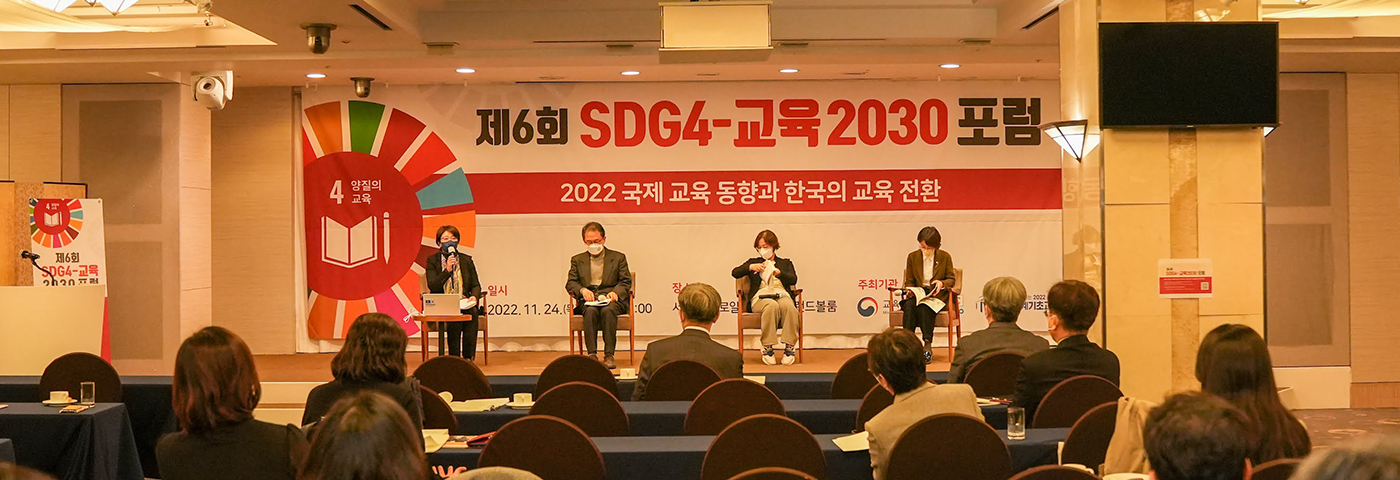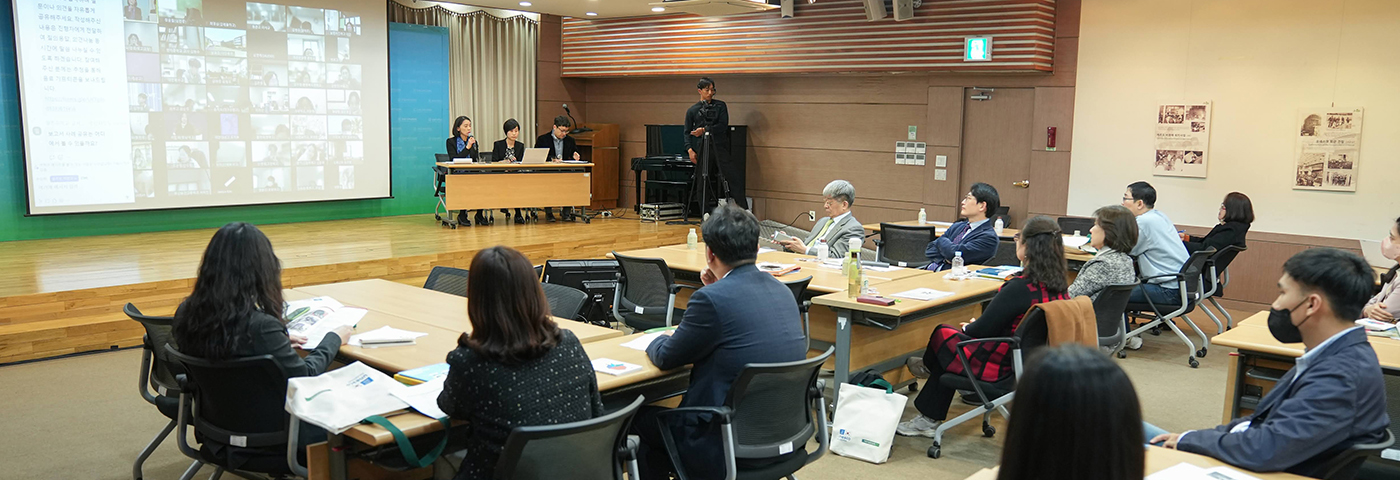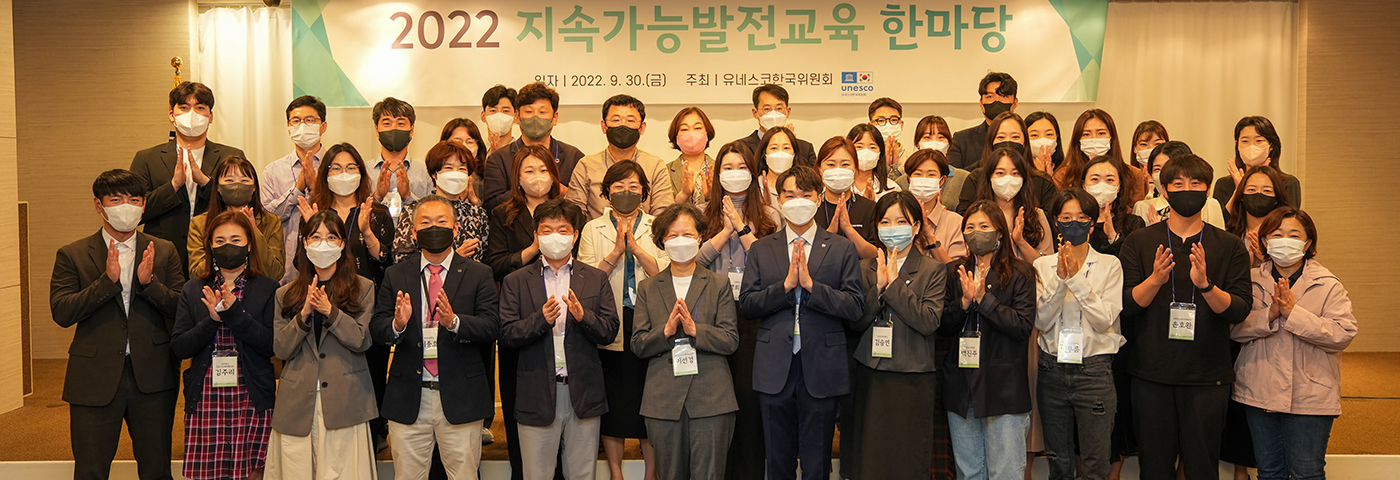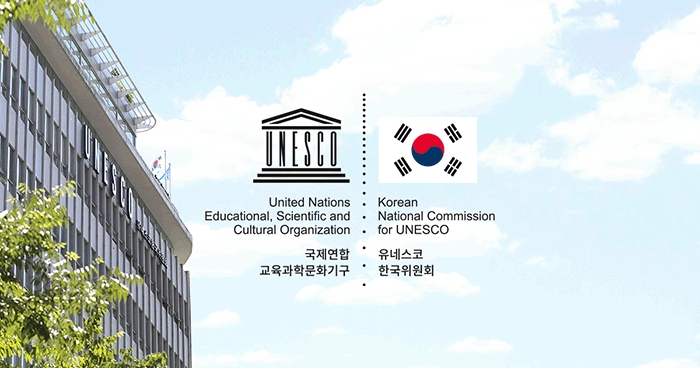Education
UNESCO considers education a basic human right as well as an essential prerequisite for sustainable development. In accordance with this belief, the Korean National Commission for UNESCO works with the government, academia, schools and civil society to ensure inclusive and equitable quality education, promote lifelong learning opportunities for all, and lead international and regional cooperation to this end.
- SDG4 - Education 2030
-
 UN Sustainable Development Goal 4 (SDG4) took concrete shape with the designation of the ‘Education 2030 Framework for Action’ (Education 2030) at the World Education Forum held in Incheon in May 2015. The Education 2030 agenda builds on the work of the previous global development agenda (the Millennium Development Goals), proposing more ambitious steps to expand educational opportunities and ensure inclusive, equitable and quality education for all. UNESCO is taking the lead in the implementation of Education 2030.
UN Sustainable Development Goal 4 (SDG4) took concrete shape with the designation of the ‘Education 2030 Framework for Action’ (Education 2030) at the World Education Forum held in Incheon in May 2015. The Education 2030 agenda builds on the work of the previous global development agenda (the Millennium Development Goals), proposing more ambitious steps to expand educational opportunities and ensure inclusive, equitable and quality education for all. UNESCO is taking the lead in the implementation of Education 2030.
-
Operation of the National Consultative Group and Working Groups on Education 2030 in the Republic of Korea
As the focal point for implementation of the Education 2030 agenda in the Republic of Korea, the KNCU operates the national consultative group on SDG4-Education 2030, comprising representatives from relevant government agencies, educational institutions, academia and civil society. The KNCU also cooperates with a number of working groups that aim to support the achievement of the sub-goals of SDG4. Working with these organizations, the KNCU monitors how Education 2030 is being implemented in the Republic of Korea and shares information, while promoting cooperation between related government agencies.
-
Participation in Global Policy-Making on the Education 2030 Agenda
The KNCU seeks cooperation with regional and international organizations to achieve the Education 2030 goals by participating in international conferences such as the meetings of the SDG-Education 2030 Steering Committee, the Asia-Pacific Meeting on Education 2030 and expert meetings to monitor the SDG4-Education 2030 agenda. The KNCU also conducts analysis of items to be discussed at such meetings, and helps experts to participate in the conferences.
-
UNESCO Global Network of Learning Cities
The UNESCO Global Network of Learning Cities (GNLC) is an international platform that was established in 2015 to support the exchange of information and cooperation on lifelong education. The KNCU’s support for South Korean cities’ membership and participation within the network is another way in which the KNCU promotes the implementation of the Education 2030 Framework for Action and international cooperation on lifelong education.
-
Research on Education 2030 and Publications
The KNCU hosts a regular SDG4-Education 2030 Forum to share information, conduct research, and monitor the implementation of the Education 2030 agenda. The KNCU also endeavors to raise public awareness and interest in Education 2030 in South Korea by publishing Korean-language versions of reports by UNESCO on the current state of education around the world and the implementation of Education 2030. The KNCU distributes these translated versions through its homepage and local networks.
관련자료
-
Operation of the National Consultative Group and Working Groups on Education 2030 in the Republic of Korea
- UNESCO Associated
Schools Network -
 The UNESCO Associated Schools Project Network (ASPnet) is a global network run by UNESCO to expand education on justice, human rights, understanding of global society, and peace. The KNCU offers a variety of programmes with schools in the Republic of Korea that are members of ASPnet to implement UNESCO’s ideals at the school level and to raise awareness of the concepts of global citizenship and sustainable development. Programmes to promote education on peace, human rights, multiculturalism and the environment include the Youth Peace Project for students at elementary, middle and high schools, and the UNESCO Korea-Japan Teachers’ Dialogue.
The UNESCO Associated Schools Project Network (ASPnet) is a global network run by UNESCO to expand education on justice, human rights, understanding of global society, and peace. The KNCU offers a variety of programmes with schools in the Republic of Korea that are members of ASPnet to implement UNESCO’s ideals at the school level and to raise awareness of the concepts of global citizenship and sustainable development. Programmes to promote education on peace, human rights, multiculturalism and the environment include the Youth Peace Project for students at elementary, middle and high schools, and the UNESCO Korea-Japan Teachers’ Dialogue.
-
Local and Overseas Programmes for Teachers and Students at ASPnet Schools
The KNCU supports global citizenship education at ASPnet schools to help students learn how to coexist with others and act responsibly as global citizens, so that they are equipped to meet the challenges faced by local communities and international society in today’s world. Globally, approximately 11,500 schools, in around 182 countries, are members of ASPnet. In the Republic of Korea, ASPnet started in 1961 with four schools. As of 2022, 554 schools in the Republic of Korea are conducting ASPnet activities. The KNCU supports the National Assembly of UNESCO Schools, recommends ASPnet school memberships, cooperates with regional education offices, shares information on Global Citizenship Education and develops relevant education materials, assists international exchanges and sisterhood ties between ASPnet schools, and operates local and international programmes for ASPnet schools. One example of the KNCU’s programmes for ASPnet schools is the Youth Peace Project, on the themes of peace, sustainable development and cultural diversity.
The KNCU supports the National Assembly of UNESCO Schools, renews schools’ ASPnet memberships, cooperates with local offices of education, shares information on global citizenship and develops education materials about it, assists international exchanges and sisterhood ties between ASPnet schools, and operates local and international programmes for ASPnet schools. One example of KNCU’s programmes for ASPnet schools is the Rainbow Youth Global Citizenship Project, on the themes of peace, human rights, multiculturalism, the environment, globalization, local culture, and economic justice. -
UNESCO Korea-Japan Teachers’ Dialogue
The Dialogue Programme has been held annually since 2001. It aims to help Korean and Japanese teachers better understand the education system and agenda in each other’s countries, through lecture programmes on educational policies, and to promote understanding and information exchange through visits to education institutions and participants’ homes. Since 2020, following the onset of COVID-19, the programme has taken place online, consisting of small group projects and discussions to co-develop a blended learning course and hold online demonstration classes in both Korean and Japanese classrooms. It aims to give participants an opportunity to share experiences and good practices in education, with a current focus on themes related to Education for Sustainable Development and Global Citizenship Education in the post-COVID era. The programme is hosted by the KNCU and the Asia/Pacific Cultural Centre for UNESCO, with the sponsorship of the Ministry of Education of the Republic of Korea and the Ministry of Education, Culture, Sports, Science and Technology of Japan.
관련자료
-
Local and Overseas Programmes for Teachers and Students at ASPnet Schools
- Education for Sustainable
Development (ESD) -
 The concept of ESD was first adopted internationally in 1992, when Agenda 21, which emphasized the critical role of education in achieving sustainable development, was adopted at the United Nations Conference on the Environment and Development. In recognition of the importance of ESD, the UN designated the years 2005-2014 as the Decade of Education for Sustainable Development (DESD), and asked UNESCO to lead activities for the DESD. As a follow-up measure to the DESD, UNESCO drew up the Global Action Programme on ESD (GAP), covering all kinds of education.
The concept of ESD was first adopted internationally in 1992, when Agenda 21, which emphasized the critical role of education in achieving sustainable development, was adopted at the United Nations Conference on the Environment and Development. In recognition of the importance of ESD, the UN designated the years 2005-2014 as the Decade of Education for Sustainable Development (DESD), and asked UNESCO to lead activities for the DESD. As a follow-up measure to the DESD, UNESCO drew up the Global Action Programme on ESD (GAP), covering all kinds of education.
The KNCU contributes to the formulation of ESD policies in the Republic of Korea and engages in ESD activities jointly with its partners at home and abroad.-
Korean National Commission on ESD
Following the UN’s initiation of the DESD, governments around the world established national commissions on ESD, working with many governmental agencies. In the Republic of Korea, the KNCU set up the Korean National Commission on ESD in 2009 in order to raise awareness about sustainable development and to participate actively in UNESCO’s ESD activities. The Korean National Commission on ESD comprises 20 experts from the government, public institutions and the civil sector, appointed by the Minister of Education. The commission holds two regular meetings annually, establishes ESD policies, develops education, research and training projects for ESD, and promotes domestic implementation of and international cooperation on ESD.
-
Korean UNESCO ESD Official Project
The KNCU introduced the Korean UNESCO ESD Official Project in 2011 to support ESD at public and private institutions and schools. The project contributes to raising awareness of the value of ESD by developing a Korean model for ESD and disseminating this, both within the Republic of Korea and internationally.
-
Research, Publication and Policy Forums on ESD
The KNCU conducts research to establish ESD as a mainstream educational policy and holds forums to formulate ESD policies and raise awareness regarding ESD. KNCU also endeavors to promote ESD by translating, publishing and distributing reports and teaching materials on ESD to schools, educational institutions and civil society.
-
Cooperation on ESD at Home and Abroad
As a member of GAP Partner Network 2 (on transforming learning and training environments), the KNCU endeavors to promote ESD at home and abroad in line with the Sustainable Development Goals and the Education 2030 agenda, while also sharing outstanding examples of ESD in the Republic of Korea with global society. The KNCU also recommends local candidates for the UNESCO prize on ESD and supports participation of local ESD networks in global capacity-building programmes in this field.
관련자료
-
Korean National Commission on ESD



.png)



